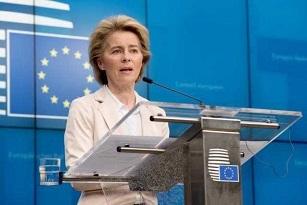
Thank you so much,
Good evening,
First of all, I want to stress that it is good that the lines of communication with Turkey remain open and active. Indeed, this constructive engagement is a precondition for any solution to the current situation we have on the Greek-Turkish border and to the plight of the migrants in this area.
Migrants need support, Greece needs support, but also Turkey needs support. And this involves finding a path forward with Turkey. Clearly we do have our disagreements. But we have spoken plainly and we have spoken openly to each other about these. It was a good conversation, it was a good dialogue and it was a constructive one.
We must now focus to find a way forward. Today's discussion focused on mapping the areas on which we can work, both in the EU's interest and in Turkey's interest. Indeed, as you said, a lot goes back to the EU-Turkey Statement of 2016, which remains valid. And we discussed today how to implement the missing pieces. To map it again, to analyse it, to find a common understanding of what is missing and what is already in place and then to implement the missing elements.
We have expressed very clearly to President Erdoğan our commitment to move forward on these issues, provided that this is reciprocal. So I think today was a good starting point. A good starting point of a process that has as an aim first of all, a perspective for the migrants and stability for the region.
Details
- Publication date
- 10 March 2020
- Author
- Directorate-General for Neighbourhood and Enlargement Negotiations
